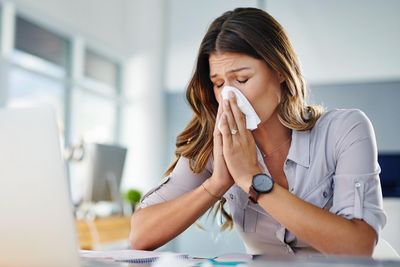This article / resource has been archived. We will no longer be updating it. For our most up-to-date information, please visit our flu/colds information here.
As women, we play many different roles: career woman, parent, caregiver, and often, all of the above. Our overbooked calendars and many daily interactions may make us even more susceptible to catching the flu. However, there are healthy habits we can practice in our everyday lives to help protect us and our families from being infected.
Here's what you can do to help protect yourself and your family:
Get the flu shot: The single best way to help prevent contracting seasonal flu is to get vaccinated each year. By getting a flu vaccine for yourself and your family, you are contributing to potentially preventing flu-related illness. The flu can be unpredictable and severe with symptoms lasting longer than a week, which can cause missed school, work, and the inability to complete household responsibilities.
According to the Centers for Disease Control and Prevention (CDC), everyone 6 months and older should get the flu vaccine. Even if you are healthy, you're still at risk of getting the flu. That's why it's important to get vaccinated as soon as the flu shot becomes available. When more people get vaccinated against the flu, less flu can spread through the community. There are several flu vaccine options available for the 2015-2016 influenza season. Talk to your pharmacist or doctor to learn more about which vaccine may be right for you.
Stay home when you are sick: If you or your child does get sick with the flu, stay home for at least 24 hours after the fever is gone. Avoid close proximity with people and keep a safe distance to protect others.
People infected with flu may be able to infect others beginning 1 day before symptoms develop and up to 5-7 days after becoming sick.
Practice good hygiene: Cover your mouth and nose with a tissue when coughing or sneezing. It may prevent those around you from getting sick.
Keep an adequate supply of tissues and hand sanitizer at your desk at work.
Wash your hands often with soap and water for 20 seconds, or with an alcohol-based hand rub.
Eat foods that may boost the immune system: While packing you or your child's lunch, try to include foods high in antioxidants, such as vegetables and fruits.
The anti-inflammatory properties in nutrient-dense foods, like dark leafy greens, salmon, and sweet potatoes may also help build your immune system.
Keep surfaces clean: Clean and disinfect frequently touched surfaces at home, work or school that may be contaminated with germs, especially when someone is ill.
Get a good night's rest: The National Institutes of Health (NIH) recommend that adults should get 7-8 hours of sleep a night. Bad sleep habits and long-term sleep loss can adversely affect your health.
Following these tips can help save you the added stress of being sick in the New Year and will give you more time to spend relaxing and enjoying the company of your family and friends!
To learn more about the flu and options to help protect you and your family, please visit whatsyourfluplan.com.
REFERENCES:
American Psychological Association. "Stress Weakens the Immune System."
Available at: https://www.apa.org/research/action/immune.aspx Accessed November 2015.
CDC. "Everyday Preventive Actions That Can Help Fight Germs, Like Flu." Seasonal Influenza (Flu) 2015.
Available at: https://www.cdc.gov/flu/pdf/freeresources/updated/e... Accessed October 2015.
CDC. "Flu Season is Around the Corner." Seasonal Influenza (Flu) 2015.
Available at: https://www.cdc.gov/features/flu Accessed October 2015.
CDC. "Key Facts about Influenza (Flu) & Flu Vaccine." Seasonal Influenza (Flu) 2015.
Available at: https://www.cdc.gov/flu/keyfacts.htm Accessed October 2015.
CDC. "Flu Symptoms and Severity." Seasonal Influenza (Flu) 2015.
Available at: https://www.cdc.gov/flu/about/disease/symptoms.htm Accessed October 2015.
CDC. "Key Facts about Seasonal Flu Vaccine." Seasonal Influenza (Flu) 2015.
Available at: https://www.cdc.gov/flu/protect/keyfacts.htm Accessed October 2015.
CDC. "Cover Your Cough." Seasonal Influenza (Flu) 2015.
Available at: https://www.cdc.gov/flu/protect/covercough.htm Accessed October 2015.
EveryDay Health. "7 Ways to Boost Your Immune System for Cold and Flu Season."
Available at: https://www.everydayhealth.com/pictures/boost-your-...
Accessed November 2015.
NIH. "How Much Sleep is Enough?"
Available at: https://www.nhlbi.nih.gov/health/health-topics/top... Accessed October 2015.


